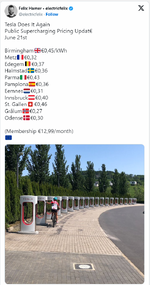Hydrogen won't really work for cars, not anytime in the next couple of decades at the very least. It would need the grid to be 100% green and with an excess green production on the grid where it makes sense to put it into hydrogen storage, which is probably 15-20 years away. There will be other storage methods we need to use first, for grid balancing though etc. All the hydrogen we do make will probably end up going in boats by then and maybe HGV's and Buses, but battery tech will possibly solve the latter two before hydrogen really becomes nationally viable.
Even then the only benefit hydrogen would have, if it did have cost parity (which it won't as home and public EV charging cost will also scale down) would be maybe 30% more range (at a significantly higher cost), but that won't even be a point as charging speeds will be even faster by then, with more destinations.
Nobody needs a 400 mile range car when you can charge a 300 mile range car in 15 minutes at 350kW, which tech is there for already. I can charge mine 270 miles in about 20 minutes and my car model has been out three years. We just need to change peoples terrible understanding that think it's stupidly large range we need, it's not, that problem isn't really a problem. If we do need anything it's more faster charging points at motorway/ a-road services and with faster charging cars. Legislation needs to be implemented so all cars can charge at 250kW plus, as this would make better use of the charge points.
Hydrogen is too cost inefficient, and energy inefficient to go through the whole process of generating electric, turn it to hydrogen, move it (the big problem), and then get the car to turn it back to electric again. It just doesn't make sense for small vehicles. We're not going to have hydrogen pipes running all over the country, other than if they end up replacing the gas pipes but that's decades away, as we would basically need every house and premises off gas, and there won't even be any point by then as the EV infrastructure will be ludicrous.

